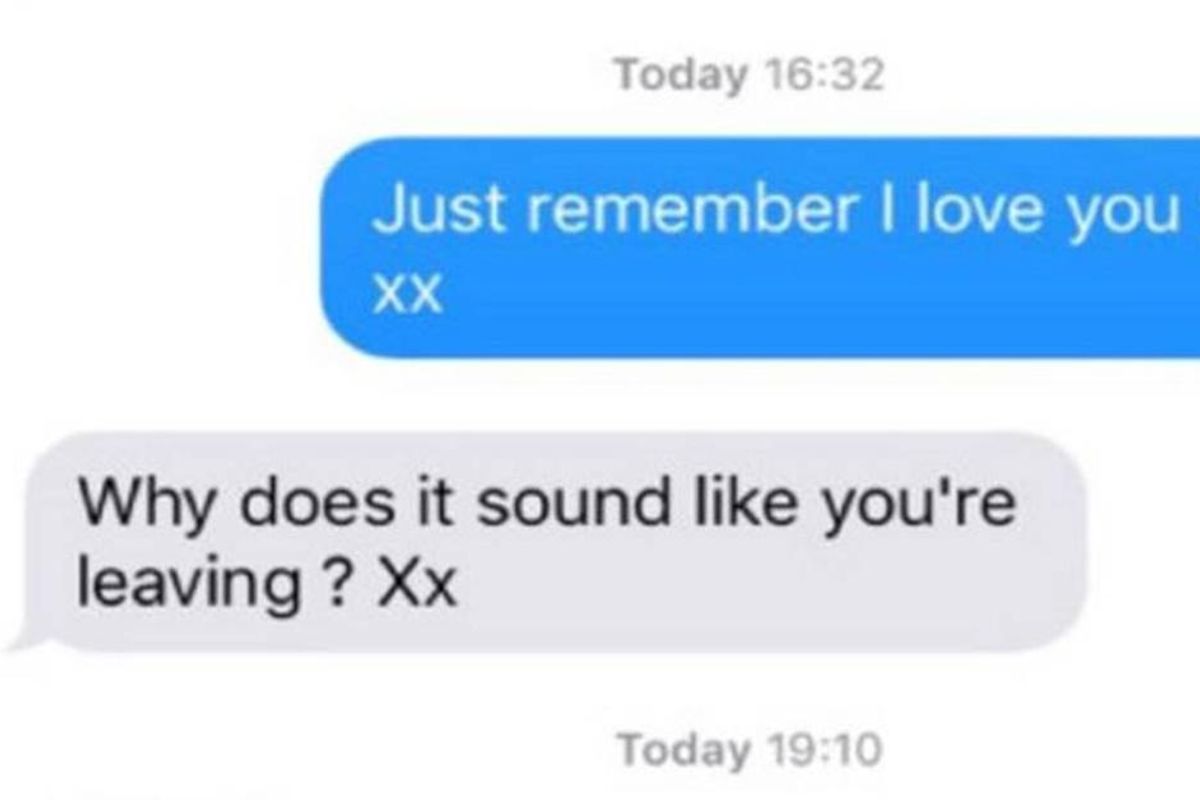The haunting final messages people have received from significant others and the deceased
Every relationship has a final text.

"Why does it sound like you're leaving?"
In every relationship we'll ever have, there's going to be a final conversation. Before the digital age, these interactions were usually face-to-face or over the telephone and could only be recorded in our memories. But now, just about every relationship leaves a paper trail of text messages, social media interactions, and voice messages. Sometimes the final communication is a heated breakup, and other times, it's a casual interaction shortly before a person's death.
A few years ago, there was a Tumblr blog that collected these haunting final messages. The Last Message Received contains submissions of the last messages people received from ex-friends or ex-significant others as well as from deceased friends and relatives. The last post was in 2021. Here are some of the blog's most haunting posts.
"My good friend's dad died around Thanksgiving. Two weeks later he drank himself to death."

Sometimes we don't know it's the last conversation.
Tumblr|TheLastMessage Received
"This is the last text I got from my mom before she died of Stage IV brain cancer at the age of 53. It left her completely paralyzed on the left side of her body, hence the typos in the texts. What she was saying was, 'You're missing music therapy.' Almost as good as Good Friday church giggles.' A few years prior to this, we went to the Good Friday service at our church. The choir was absolutely horrendous and couldn't sing whatsoever. She and I sat there, in the most serious, somber church service of all, laughing hysterically, unable to stop for the life of us. She sent me this text while she was in hospice and I was at school."

Sometimes the last message is a happy one.
"This happened a few months back. He was my best friend and my boyfriend of 7 years. He stuck with me when I fell pregnant at 16 after I was raped. He became an actual dad to my son. He was my everything. A few months before this message, things started to change, we drifted apart and he was telling my 5 year old son to lie to me about his whereabouts. One night he beat me, I ended up in hospital for a few days. He begged for forgiveness, I stayed. It happened again a few days later, he was at work when I text him. I took my son and left. This is the last text I received from him. I heard last week that he's just been sent to prison for crimes involving violence and drugs. I hope he gets the help he needs."

Sometimes the last message is abrupt.
"My dad died 6 weeks later flying the plane in this picture."

Sometimes the last message is simple and innocuous.
"The last text he sent me. The next day I got a call from his daughter that he was still very much with his wife and I wasn't the only one he was cheating on her with."

Sometimes there's no indication anything is wrong.
"She had sent me a message earlier asking me not to contact her anymore. I woke up to one last message. We'd dated for 3.5 years and when I came out as trans, the relationship fell apart. I still think about and miss her every day."

Sometimes you know it's the end.
"I sent this to my grandpa on thanksgiving. Two days later he unexpectedly had a heart attack and passed. He was my favorite person in the world and nothing has been the same since. I refuse to delete this message."

Sometimes the last message is a simple holiday wish.
"I would have fallen in love with her if distance and timing hadn't gotten in the way. I'm ignoring her because I need to let her move on."

Sometimes the last message is a call out that goes unanswered.
We don't always know when the last time is the last time. Moving forward, let's be sure to be honest, open, and communicative with the ones we love.
This article originally appeared five years ago.
- Josh Gad shares one of his final texts from Chadwick Boseman: 'He ... ›
- Please read this before you post another RIP on social media ... ›
- Incredibly moving last messages from loved ones. - Upworthy ›
- Daughter makes incredible art out of her of dad's text messages - Upworthy ›
- Guy's brutally honest breakup text goes viral and reminds everyone that 'ghosting' isn't cool - Upworthy ›
- Gen Z sees periods in texts as aggressive. Nope. They're not. - Upworthy ›






 a man sitting at a desk with his head on his arms Photo by
a man sitting at a desk with his head on his arms Photo by  Can a warm cup of tea help you sleep better? If you believe it, then yes. Photo by
Can a warm cup of tea help you sleep better? If you believe it, then yes. Photo by 
 A happy Gen X couple have patience for younger generations, like Gen Z.
A happy Gen X couple have patience for younger generations, like Gen Z.
 A group of friends chatting wearing masks.via
A group of friends chatting wearing masks.via 
 Some stray cats wander from home to home like a drifter.
Some stray cats wander from home to home like a drifter.  Stray cats should be spayed and neutered.
Stray cats should be spayed and neutered. 
 A woman getting her nails painted.via
A woman getting her nails painted.via
Curvy-and-proud newscaster takes the wildest viewer comments turns them into pure comedy gold